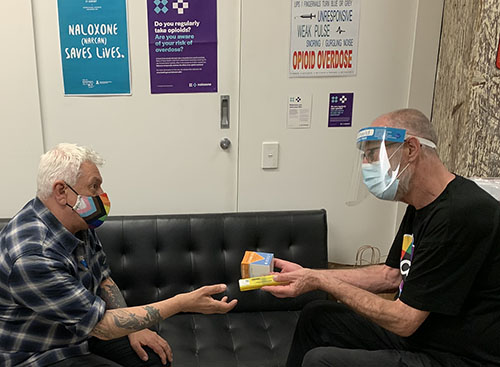Non-governmental organisations across NSW are helping reduce deaths from opioid overdose in their communities by participating in the NSW Take Home Naloxone program. So far, 47 NGO services are participating, and 219 workers have been trained and credentialed to supply naloxone. Since March 2021, NGOs have provided 322 units of naloxone to their clients. That's in addition to the 80 public health services and 680 community pharmacies in the state.
"We've actually had 10 people that've come in and said that they've saved lives through the naloxone program," reports ACON Needle and Syringe Program Coordinator Roderick Smith. "That's only the ones we know about, there's probably a lot more."
Naloxone quickly reverses the effects of an opioid overdose and gets people breathing again. It can be competently administered by community members with only basic training. By providing education and naloxone, the program empowers clients to keep themselves and those around them safer.
"It really is a no-brainer. There is substantial evidence that naloxone saves lives. The death toll from opioid overdoses is ever-increasing. So it really is something that had to happen," said Dr Mary Ellen Harrod, Chief Executive Officer of NSW Users & AIDS Association (NUAA).
We know from the Penington Institute's Australia's Annual Overdose Report 2021 that unintentional drug-induced deaths from opioids have almost tripled in the past 14 years. Since October 2020, a number of people in areas across NSW have overdosed after using cocaine or other stimulant drugs that were unexpectedly contaminated with opioid drugs. This means there are many people in the NSW community that may experience or witness an opioid overdose, and so could benefit from having access to naloxone.
"When we offer our clients naloxone, it doesn't necessarily mean that it's because you're going to go out and relapse and use. It's about keeping other people safe and saving lives," said Carolyn Stubley, Nurse Manager for WHOS (We Help Ourselves), which operates therapeutic community residential programs. "All of our programs introduce Take Home Naloxone in our overdose prevention program that we conduct in all the services. So we've made sure that the training is part of our overdose prevention strategies for the Take Home Naloxone, and we encourage all clients, regardless of whether they're opioid users, to take up an offer of the Take Home Naloxone. … Would they assist someone in the community if they witnessed an overdose? Do they know anybody who uses opioids? We're trying to get every person who leaves our services to take the Take Home Naloxone."
The NSW Take Home Naloxone Program in increasing the number and range of workers and volunteers who can supply naloxone to clients. Drug and alcohol workers, peer workers and Aboriginal health workers are among the many groups that can get credentialed to supply naloxone. The program trains workers for free and enables NGOs to supply naloxone for free to clients.
"I think that's a really good way to encourage them, by empowering them as someone who could potentially save a life by carrying naloxone on them, especially if they have family or friends, even with the prescription opioids," said Dr. Harrod.
"This is our community. These are our friends. They're our neighbours, they're our loved ones, that are overdosing. So preventing overdose is really, hugely important to us, and it's a really important part of harm reduction in general."
Dr Mary Ellen Harrod, Chief Executive Officer of NSW Users & AIDS Association (NUAA)
Clients are more likely to trust NGOs they're already familiar with. NGOs are encouraged to discuss naloxone with all clients. This can help destigmatise opioid-related conversations and can remind workers and clients that preventing opioid overdose harms is a community issue. Many people would benefit from having naloxone on hand.
"I carry it with me all the time, because you never know. You just never know," said Smith.
NGOs that provide drug and alcohol, mental health and homelessness services can apply now to become a Take Home Naloxone supply site. Aboriginal health services are also encouraged to consider providing this service. For more information about the program, visit health.nsw.gov.au/aod/programs/Pages/naloxone-ngo-and-private-service.aspx or email moh-naloxone@health.nsw.gov.au.
